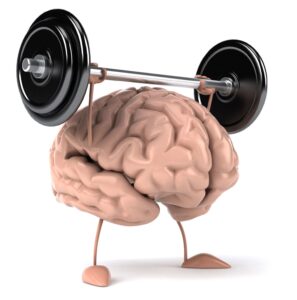When discussing ways to maintain mental sharpness as we age, most conversations gravitate towards sudoku puzzles, learning new languages, or perhaps taking a brisk walk. Yet emerging research reveals a powerful cognitive ally that’s been hiding in plain sight at your local gym: strength training.
For years, aerobic exercise has dominated discussions about physical activity and brain health. However, scientific evidence now suggests that incorporating resistance exercises into your routine might be equally crucial for preserving cognitive function, particularly as we age. The relationship between muscular strength and brain health represents an exciting frontier in our understanding of how physical activity influences neurological wellbeing.
I’ve witnessed firsthand how clients who commit to regular strength sessions report not just physical transformations, but mental clarity and improved mood as well. These anecdotal observations now have substantial scientific backing, with research demonstrating that resistance training offers unique neuroprotective benefits that complement those provided by cardiovascular exercise.

Let’s explore how lifting weights might be one of the most effective ways to future-proof your brain against age-related decline, and why incorporating resistance training into your fitness regimen could yield cognitive dividends that extend far beyond muscular development.
The Science Behind Strength Training and Brain Health
The connection between resistance exercise and cognitive function isn’t merely coincidental. Research has uncovered several biological mechanisms through which strength training directly influences brain health. When you perform resistance exercises, your body initiates a cascade of physiological responses that extend well beyond muscle tissue.
One key pathway involves metabolic regulation. Resistance training has been shown to improve insulin sensitivity and glucose metabolism, which are crucial for optimal brain function. Studies indicate that a single session of strength training can lower glucose and insulin levels for up to 24 hours, creating a more stable metabolic environment that benefits neurological processes.
Additionally, resistance training stimulates the production of specialised molecules called myokines. These chemical messengers, released by contracting muscles, can cross the blood-brain barrier and directly influence brain function. Some well-studied myokines include brain-derived neurotrophic factor (BDNF), which supports neuroplasticity, and insulin-like growth factor 1 (IGF-1), which promotes neural growth and repair.
Perhaps most remarkably, research has demonstrated that strength training can actually help preserve brain volume in regions particularly vulnerable to age-related degeneration. A groundbreaking study from the University of Sydney found that six months of resistance training protected hippocampal subregions from shrinkage for up to a year after the training concluded. This is significant because the hippocampus plays a crucial role in memory formation and is often one of the first brain areas affected by Alzheimer’s disease.

Cognitive Benefits for Older Adults
For seniors, the cognitive advantages of strength training are particularly pronounced. Research consistently shows that older adults who engage in regular resistance exercise demonstrate better cognitive performance across multiple domains, including memory, executive function, and processing speed.
A clinical trial involving older individuals with mild cognitive impairment—a condition that significantly increases dementia risk—found that resistance training led to measurable improvements in cognitive function. Participants who lifted weights showed enhanced memory and executive function compared to control groups, suggesting that strength training might be especially beneficial for those already experiencing some cognitive decline.
What makes these findings particularly remarkable is that no pharmaceutical intervention currently available can match this combination of cognitive benefits. While medications might target specific aspects of brain function, strength training appears to support cognitive health through multiple complementary pathways simultaneously.
The protective effects extend beyond just slowing decline. Some studies indicate that resistance training can actually reverse certain aspects of age-related cognitive impairment. This restorative potential represents a paradigm shift in how we approach brain health in later life—moving from merely accepting cognitive decline as inevitable to actively countering it through targeted physical activity.
Metabolic Balance and Brain Protection
One of the most fascinating connections between strength training and brain health involves metabolic regulation. Researchers have proposed that Alzheimer’s disease could be considered a form of “type 3 diabetes” due to the brain’s diminished ability to utilise glucose effectively—a condition that worsens with age.
Resistance training directly addresses this metabolic vulnerability. By improving insulin sensitivity and glucose regulation throughout the body, strength exercises help ensure that brain cells receive the energy they need to function optimally. This metabolic tuning may be particularly important for preventing the energy deficits that contribute to neurodegeneration.
The evidence supporting this connection is compelling. Multiple meta-analyses have confirmed that resistance training improves glycaemic control in individuals at risk for type 2 diabetes. Similarly, studies have shown that strength training can reduce insulin requirements in pregnant women with gestational diabetes, highlighting its powerful effect on metabolic health.
For older adults, this metabolic benefit may be especially valuable. A 2021 meta-analysis published in the Journal of Exercise Science and Fitness found that resistance training significantly improved insulin sensitivity in elderly participants. Given that metabolic dysfunction increases the risk of both depression and dementia, strength training’s ability to maintain metabolic balance represents a powerful tool for protecting brain health.
Inflammation, Immunity and Neural Health
Beyond its metabolic effects, strength training also influences brain health through immune modulation and inflammation control. Chronic inflammation is increasingly recognised as a key driver of neurodegeneration, and resistance exercise appears to help regulate inflammatory processes in ways that benefit the brain.
Research has shown that individuals with greater muscle mass typically display lower levels of inflammatory markers in their bloodstream. Similarly, stronger grip and knee extension capabilities correlate with reduced systemic inflammation. This anti-inflammatory effect may help protect neural tissue from damage and support optimal brain function.
The myokines produced during resistance exercise play a crucial role in this immune-modulating effect. These muscle-derived signalling molecules can directly and indirectly influence the brain’s immune system, potentially reducing neuroinflammation and supporting neural repair processes.
Interestingly, studies using proton magnetic resonance spectroscopy have found that resistance training can alter levels of various neurometabolites in ways that correspond to improved brain health. These changes suggest that strength training may help preserve neuronal integrity and function, particularly in brain regions vulnerable to age-related decline.
Practical Implementation: Building a Brain-Boosting Strength Routine
Translating these scientific insights into practical application doesn’t require complex equipment or extensive time commitments. Even modest amounts of resistance training can yield significant cognitive benefits when performed consistently.
For beginners, starting with lighter weights and focusing on proper form is essential. The good news is that research suggests you don’t need to lift extremely heavy weights to gain brain benefits—consistent, moderate-intensity resistance training appears to be effective for cognitive enhancement.

Consider incorporating these elements into your routine:
- Progressive overload: Gradually increase resistance as your strength improves
- Compound movements: Prioritise exercises that engage multiple muscle groups simultaneously
- Lower body focus: Don’t neglect leg exercises, as the largest muscles in your body may produce more beneficial myokines
- Consistency: Aim for at least two sessions per week, ideally with 48 hours of recovery between working the same muscle groups
- Professional guidance: If you’re new to resistance training, working with a qualified trainer can help ensure proper technique and appropriate progression

Remember that sustainability is key. The cognitive benefits of strength training accumulate over time, so choosing exercises and intensities that you can maintain long-term will yield better results than sporadic, overly intense sessions that lead to burnout or injury. When in doubt, I highly recommend consulting with an experienced coach or personal trainer for help devising a suitable workout program. Even if you are not located near enough to visit us in person, please feel free to get in touch and we will be happy to send you a free workout guide or make a recommendation for something closer to you.
Conclusion: Strength Training as Cognitive Medicine
The evidence is clear: resistance training deserves a central place in any comprehensive strategy for maintaining cognitive health, particularly as we age. Its unique ability to improve metabolic function, reduce inflammation, and directly support brain structure and function makes it an invaluable tool for protecting against cognitive decline.
What makes strength training particularly remarkable is its accessibility. Unlike pharmaceutical interventions, which often come with significant side effects and costs, resistance exercise is available to most people and offers benefits that extend far beyond brain health—including improved mobility, reduced fall risk, better bone density, and enhanced quality of life.
If you’d like to learn more about strength training at The Performance Hub, please CLICK HERE to speak to one of our expert coaches.
As our understanding of the brain-muscle connection continues to evolve, one thing remains certain: the path to better cognitive health runs directly through the weight room. By incorporating regular resistance training into our lives, we’re not just building stronger bodies—we’re building more resilient brains capable of withstanding the challenges of aging.
So the next time you pick up those dumbbells or step up to that resistance machine, remember that you’re doing more than just strengthening your muscles. You’re making an investment in your cognitive future that no pill or supplement can match.
P.S. To learn more about all things health and fitness remember to check out our other BLOG posts as well as The Performance Hub Podcast!


